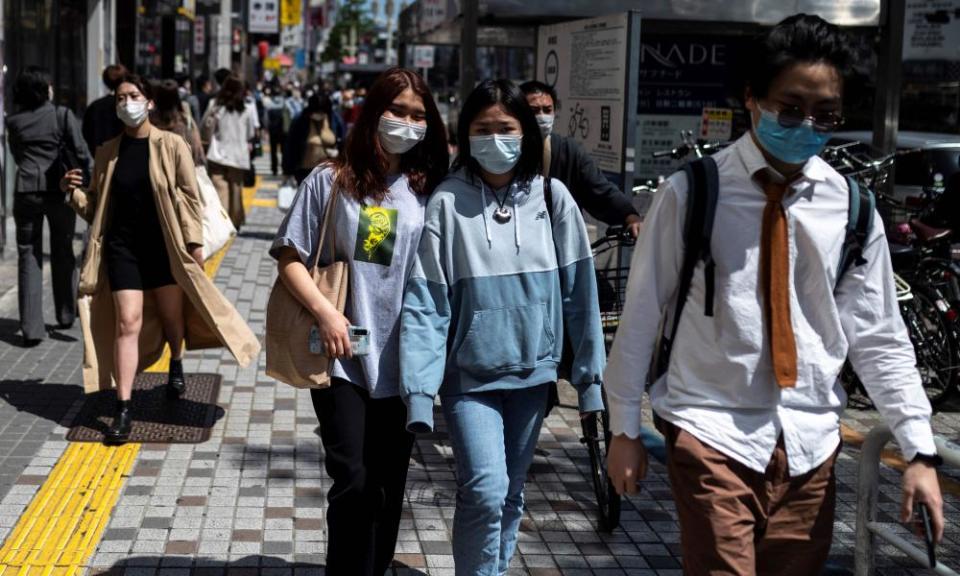Japan declares targeted state of emergency as Covid cases surge

Japan has declared a targeted state of emergency for Tokyo, Osaka and two other prefectures in an attempt to halt a surge in coronavirus cases, just three months before the Tokyo Olympics.
The measures will go into effect in the four areas – covering about a quarter of Japan’s population and a third of its economy – from Sunday until at least 11 May.
“We absolutely have to limit the movement of people, and we have to do it decisively. We need powerful, short and focused measures,” the minister in charge of the pandemic response, Yasutoshi Nishimura, said, adding that people should remember the lockdowns of last spring and stay at home.
The government had come under pressure to take action after a sharp rise in infections in the capital, and evidence that new variants of the virus are driving serious outbreaks in Osaka and the two neighbouring prefectures of Hyogo and Kyoto.
Experts and local leaders have been warning for days that ongoing quasi-emergency measures were failing to keep the virus in check.
Japan’s third state of emergency since the start of the pandemic will coincide with Golden Week – several days of consecutive holidays during which there is normally a huge increase in domestic travel.
While Japanese authorities are unable to impose European-style lockdowns, bars and restaurants that serve alcohol will be asked to close, while other eateries will be encouraged to close early. Large-scale events, such as football and baseball matches, will be held behind closed doors.
Department stores and shopping malls will also be asked to close – although shops selling essential items will stay open – as well as theme parks, theatres and museums. Bus and train services will be reduced during public holidays and weekends, the Nikkei business newspaper reported.
Businesses that comply are eligible for compensation, while fines will be issued to violators.
Tokyo’s governor, Yuriko Koike, urged residents to start taking precautions immediately, including avoiding drinking in the street after bars and restaurants close early.
She also urged businesses to turn their lights off in the evenings to encourage people to go home. “After 8pm, we ask that bright signage on streets, neon signs and illuminations be turned off,” she said. “It will be dark at night, with only street lights on to curb the flow of people.”
Japan has had a comparatively small Covid-19 outbreak, with 9,800 deaths and just over half a million cases, despite the absence of the strict lockdowns seen in other countries.
But the emergence of the UK and other variants – which account for about 80% of cases in Osaka and Hyogo – and pressure on health services in some areas have forced Prime Minister Yoshihide Suga’s hand.
Tokyo recorded 759 new infections on Friday, while Osaka reported 1,162 cases, slightly down from a record number two days earlier.
Earlier this week, Suga insisted the emergency measures would not affect preparations for the Tokyo Games.
Yet the virus has already caused disruption to test events, qualifiers and the torch relay, which had to take place in an empty park in Osaka last week and will be kept off public roads in Okinawa prefecture next month. On Thursday, the governor of Ehime prefecture broke down in tears as he explained his decision not to allow the relay to pass through the local city of Matsuyama.
On Friday, Australia’s diving team withdrew from the Diving World Cup, scheduled for 1-6 May in Tokyo, saying it was “not safe” to travel to Japan.
And in a move that could fuel doubts about the Olympics, the Tokyo Motor Show was cancelled for the first time in its history, with organisers citing Covid-19 concerns. The biennial event was due to take place in the autumn, several weeks after the Games.
The new emergency measures could be lifted days before the president of the International Olympic Committee [IOC], Thomas Bach, is due to arrive in Japan to encourage organisers, who have repeatedly promised to put on a “safe and secure” event.
Bach, who has insisted that the delayed Games cannot be postponed a second time, sparked anger this week when he said the state of emergency was a “preemptive measure” and “not related” to the Olympics.
On Friday, the president of the Tokyo 2020 organising committee, Seiko Hashimoto, said the emergency measures would not affect the Games. “We’re not thinking about cancellation,” she said. “We’re thinking about how we can prepare in a way that prioritises safety and makes people feel it can be held safely, and makes them want it to be held.”
The Japanese public is firmly opposed to holding the Games this summer, according to a recent poll by the Kyodo news agency, in which a combined 72% of respondents said they should either be cancelled or postponed again.
The situation in Osaka is causing particular alarm among health experts. Almost all of the prefecture’s beds for seriously ill Covid-19 patients are full, and dozens of nurses will be sent from other parts of the country to help deal with the rise in hospital admissions.
Japan’s slow vaccination programme has left it with little choice other than to request restrictions on business operations and people’s movements, with a focus on bars and restaurants, described by the government’s top spokesman, Katsunobu Kato, as “key points” of infection.
Since vaccinations began in mid-February, about 1.5 million people – mainly frontline medical workers – have received one dose, and 827,000 have been fully vaccinated.
The country’s vaccine chief, Taro Kono, has said vaccinations would speed up in the coming weeks with the arrival of more shipments of Pfizer doses, the only vaccine to have been approved so far in Japan.

 Yahoo Movies
Yahoo Movies 